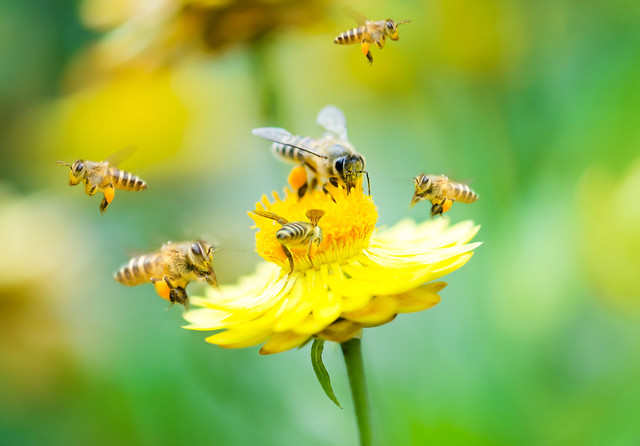
Bees and other pollinators, including birds, bats, butterflies, moths, flies, wasps, beetles, and small mammals, play a critical role in our food production system. A healthy pollinator population is vital to producing marketable commodities. More than 100 U.S. grown crops rely on pollinators. The added revenue to crop production from pollinators is valued at $18 billion. Pollinators also support healthy ecosystems needed for clean air, stable soils, and a diverse wildlife. That’s why USDA’s National Institute of Food and Agriculture (NIFA) partners with the Land-Grant University System, U.S. government laboratories, and private and non-profit organizations to support research, education, and extension programs advancing pollinator health.
Today, pollinators — especially Western honey bee populations — are at a critical crossroads. The total annual value of U.S. honey bee products and services sold is approximately $700 million. Honey bee pollination increases crop production and quality for a wide variety of foods, including fruits, nuts, vegetables, legumes, oilseeds, and forage crops. Beginning in 2006, experts noted significant yearly declines in honey bee colonies. These declines were attributed in part to a phenomena referred to as Colony Collapse Disorder (CCD), an abnormal condition that occurs when the majority of worker bees in a honey bee colony disappears, leaving behind a queen, an abundant supply of food, and a few nurse bees to care for remaining immature bees. Years of research determined the decline was likely attributable to a wide range of stressors such as pests, diseases, pesticides, pollutants/toxins, nutritional deficits, habitat loss, effects of climate variability, agricultural production intensification, reduced species or genetic diversity, and pollinator or crop management practices.
By focusing efforts on pollinator health, the U.S. today has about 2.8 million honey bee hives, and no incidents of CCD have been reported in several years. To continue this upward trend in pollinator populations, NIFA funds research to promote pollinator health and to address challenges affecting pollinators essential to U.S. agricultural crops, primarily through the Agriculture and Food Research Initiative Program.
In 2019, NIFA awarded approximately $4 million in competitive grants for pollinator health-related projects. Examples of past projects addressing pollinator health include: Honeybee Hive Monitoring System for Varroa Mite Management & Honey Bee Health; Using Vaccines to Increase Pollinator Health: Testing a Honey Bee Nosema Vaccine; and Quantifying the Intersections Between Neonicotinoid Insecticide Use for Seed Treatments and Foraging Honey Bees. Results from these projects will help preserve pollinator populations and promote continued improvement in crop yields and the environment.
Source: U.S. Department of Agriculture
Technical Supported and brought to you by Japan Press Release

